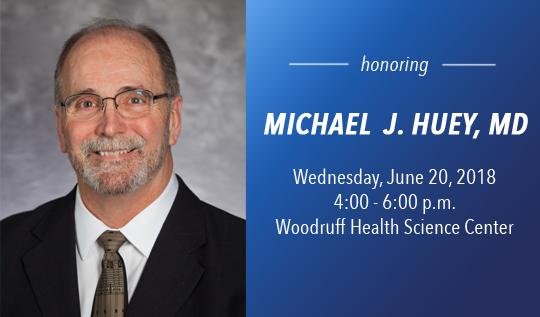
June 18, 2018

By S.A. Reid, Contributing Writer
Michael J. Huey, MD, retires July 31 as assistant vice president of Campus Life and executive director of Emory University Student Health Services. Earlier this year, he stepped down as head team physician with Emory Athletics but plans to continue as a team physician. Huey has served also as associate professor of Family and Preventative Medicine at the Emory School of Medicine. By all accounts, his contributions to the health and safety of Emory’s students, faculty, and staff have been exemplary and his impact enormous.
Huey says he has enjoyed his 16 years at Emory but, at age 64, is looking forward to doing more consulting, working abroad, and traveling with his wife, Fontaine. He came to Emory in 2002 from the University of Florida, where he held similar student health and teaching positions and served as a team physician. ECL Connections caught up with Huey recently to chat about his time with Emory. Following are some of the thoughts he shared with us.
Q: What accomplishments are you most proud of during your tenure at Emory?
A: A good student health insurance plan that provides good coverage and access to quality care is now available to students so they can stay healthy while they are in college and complete their academic studies. That is something I feel very good about. And, earlier this month, the federal and state governments approved the self-insured Emory Student Health Insurance Plan, which means the plan will actually be owned by Emory with Aetna as an administrative partner.
Additionally, we have significantly expanded both our medical and mental health offerings for students, particularly placing a lot of emphasis on mental health and counseling, which I think are incredibly important areas. We now make transgender hormonal therapy and HIV-prevention medications (called PrEP) available through our student clinic. Together with our outstanding athletic trainers and Emory Ortho and Sports Medicine, we have built a model NCAA Division III intercollegiate sports medicine program that provides excellent support to our athletes, both medically and psychologically. So, I am proud of that as well.
Q: As your retirement nears, are there any things left undone?
A: We have a number of major projects going on right now. Additionally, we are putting a new structure around immunization compliance. I think it is very important for Emory and Emory students to meet the standards of the CDC in terms of immunizations against vaccine-preventative diseases to keep both the campus and individual students safe. We have been putting initiatives in place to make sure that compliance happens in a timely manner. Both efforts are in their final stages of development. I think those are the two biggest ongoing initiatives. We are also looking at different ways to finance how we do laboratory testing for students. And Emory Student Health undergoes our sixth national accreditation survey in January 2019. So, the new assistant vice president of Student Health Services, Sharon Rabinovitz, is going to have plenty to keep her busy.
Q: Your involvement in student health outside of Emory has been significant. How has the university benefited?
A: I hope the answer is “significantly.” First of all, I am extraordinarily grateful to Emory for the support that our programs and I have received. Emory has been a magnificent partner in what we have been trying to do and has shown a tremendous willingness to allow me to do work outside of the university. My involvement in the American College Health Association, which has culminated this year in being president, and in doing college health accreditation surveys has really helped me to be a better leader and helped our student health, counseling, and wellness services do a better job. Emory is a tremendous supporter of its faculty and staff working at the regional and national levels, contributing to national organizations, and bringing back what we have learned to our campus. It enhances the work we do at Emory as well as the university’s national and international reputation. So, it is a win-win for sure.
Q: What do you think you will miss the most about Emory and will you leave with as many regrets as you had when you left Florida?
A: Actually, I will leave with even more regrets. I loved being at Florida but coming to Emory was such a great opportunity for me, and Atlanta has proven
Learn more about Student Health Services at http://studenthealth.emory.edu/hs/
Editor’s note: A retirement celebration is scheduled for Michael J. Huey, MD, Wednesday, June 20, from 4 to 6 p.m., in the Woodruff Health Sciences Building Lobby, 2nd floor, 1440 Clifton Rd.